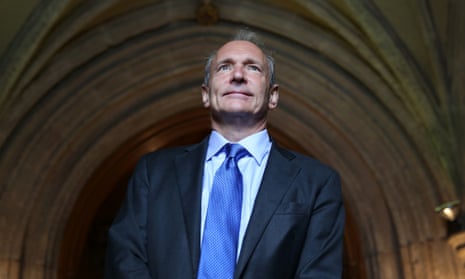The data we create about ourselves should be owned by each of us, not by the large companies that harvest it, the Tim Berners-Lee, the inventor of the world wide web, said today.
Berners-Lee told the IPExpo Europe in London’s Excel Centre that the potential of big data will be wasted as its current owners use it to serve ever more “queasy” targeted advertising.
By gaining access to their own data, people could use it with information about themselves from other sources in order to create “rich data” – a far more valuable commodity than mere “big data”, he said.
Berners-Lee said that “people only look at one angle” of big data. “When you read big data pieces in a magazine, it’s about how big companies are spying on you. A lot of the marvel of big data is a threat to me.
“What are these people going to do with that data? They’re going to target you with an ad which makes you feel a bit queasy. Targeted adverts are not the future.”
Instead, users should own their own data and be free to merge it with other sets as and when it could provide them useful insight, he said.
“That data that [firms] have about you isn’t valuable to them as it is to you,” he said. “I have almost a year as worth of data from [Facebook-owned location-tracking app] Moves. I can see how my exercise has gone up and down.
“In general … if you put together all that data, from my wearable, my house, from other companies like the credit card company and the banks, from all the social networks, I can give my computer a good view of my life, and I can use that. That information is more valuable to me than it is to the cloud.”
Berners-Lee, who wrote the first memo detailing the idea of the world wide web 25 years ago this year, while working for physics lab Cern in Switzerland, told the conference that the value of “merging” data was under-appreciated in many areas.
Speaking to public data providers, he said: “I’m not interested in your data; I’m interested in merging your data with other data. Your data will never be as exciting as what I can merge it with.
The idea of a web focused around letting users easily find, share and combine information is promoted by Berners-Lee as the “semantic web”, and has been a focus of W3C, the body he founded to oversee the development of the web, since 2001.
“Lots of people said: ‘Open data, this is about government transparency; we can track who is committing expense fraud.’ Well, yes, a world where I have to reveal how I spend public money is better, but more importantly,, that data can be used elsewhere to run a better economy.”
Addressing the privacy implications of such a world, Berners-Lee argued that the burden of tracking should be moved from the typical web user to the individuals and organisations with access to our data.
“We turn tracking around: … make tracking something that we do to the people who use our data.” That way, he argued, we would not have to completely lock down sensitive information such as our health data, so that if we’re in a car accident, the right person can still access important information – but only by notifying us that they have done so.
He added that such a reversal of norms could do great things for medical research, citing an example of a theoretical, wide-ranging study into the long-term effects of a popular medicine.
“If you give [people] the ability to see how [data is] used and you ban its misuse then people are much more happy to open up to their data being used. Finding drugs, we need to be able to look at a massive amount of data.”

Comments (…)
Sign in or create your Guardian account to join the discussion